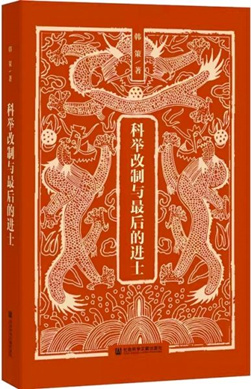
. > WHAT'S NEW > BOOKS
Academic innovation during the imperial examination reform
Author : LI XIZHU Source : Chinese Social Sciences Today 2018-03-06

Reform of the Imperial Examination and the Last Jinshi
Author: Han Ce
Publisher: Social Sciences Academic Press (CHINA)
The reform of the imperial examination system was an important part of the late Qing reforms. Many academic achievements have been made in this regard, but there is a lack of in depth research on the last subjects who took the examinations and the Jinshi groups (candidates who successfully took the highest imperial examinations).
By reviewing the existing relevant achievements, Han Ce’s monograph Reform of the Imperial Examination and the Last Jinshi, consists of systematic and intensive research. It conducts this research through the use of rich literature and materials, including many unpublished public and private documents and manuscripts, as well as a large number of published archives, official documents, compilations of materials, diaries, letters, anthologies, newspapers and other literature relating to the imperial examinations.
There were many areas where Han supplemented research and corrected mistakes. These included rules released in 1901 to change the imperial examination, particularly in how it related to the Guimao and Jiachen subjects. Han also extensively studied imperial reforms and the political life and pursuit of humanities by the Guimao and Jiachen Jinshi groups during the late Qing Dynasty.
The author cleverly combines studies of the history of these systems with personal relationships. He did not simply analyze the text and describe the processes used at the time, but also penetrated the complex human relations behind the text, so as to reflect the vivid historical scenes which emerged from the interaction between the institutional changes centered on the reform of the imperial examination and personal entanglements.
Many years ago, some scholars pointed out that research on the history of the Revolution of 1911 formed an “academic plateau,” which meant further research was difficult. Nowadays, the study of political history in the late Qing dynasty, including the history of the Revolution of 1911, seems to have entered the same state as a whole after a long period of academic accumulation, but it is not at its worst. Han’s work shows the possibility of advancing the study of the political history of the late Qing Dynasty on a profound academic foundation.
Power is at the core of political conflict. Behind power, lies conflicts of interest. There are various systems and rules for the principle of distribution of power and interests, involving complicated personal relations. Therefore, political history research has two research focuses: the system of rules and regulations, and personal relations. Rules and regulations are the basic framework for a political order, which are unalterable clauses once enacted. But human factors are indispensable in the brewing, formulation, promulgation and operation of any rules-based system. Personal relations are not only at the core of the text of any system, but are also tied to a variety of unspoken rules. This is an incredibly complex area of politics, and only by grasping this mystery, can political history research shed light on the issues that matter.
(Edited and translated by SUI JINGJING)
Ye Shengtao made Chinese fairy tales from a wilderness
Ye Shengtao (1894–1988) created the first collection of fairy tales in the history of Chinese children’s literature...
-
How northern ethnicities integrated into Chinese nation
2023-09-18
-
Mogao caves
2023-09-12
-
Mogao Grottoes as ‘a place of pilgrimage’
2023-09-12
-
Time-honored architectural traditions in China
2023-08-29
-
Disentangling the civilizational evolution of China
2023-08-28
-
AI ethics in science fiction
2023-08-23













 2011-2013 by www.cssn.cn. All Rights Reserved
2011-2013 by www.cssn.cn. All Rights Reserved